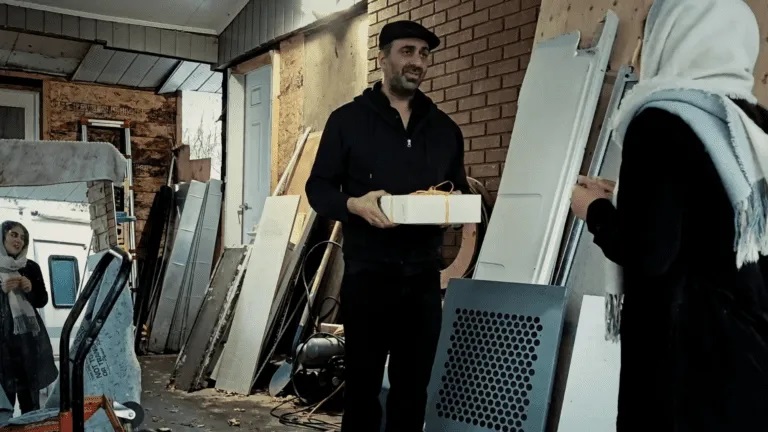Does an honest life mean a good life? This central dilemma plagues Nima (Nima Sadr) throughout A Shrine, the new film by Iranian director Abdolreza Kahani. The award-winning filmmaker’s latest picture sees him take an experimental approach, filming in a technically minimalist style to produce a comedy-drama rife with contradiction and pathos. A Shrine is a sensitive and intimate portrayal of the struggle to serve others while also serving yourself.
Nima, a middle-aged man working in a garage in Montreal, hears that one of his peers is taking his mother to Iran to visit a shrine. Realising how expensive these trips are, Nima is inspired to create a portable shrine which is accessible through a window in his RV. He drives to wherever people need him so they can pray and leave donations. However, as the money piles up, Nima becomes racked with guilt and is sent on a depressive spiral with consequences for his mental and physical health.

As revealed by the highly personalised end credits, A Shrine is deceptively simple in its execution. Kahani is almost a one-man band when it comes to filming, and Sadr is the only established actor taking part. He is far from the only director to employ this method; Sean Baker is perhaps the most prolific example. But while Baker typically draws attention to this alternative cinematic apparatus, Kahani casts such a spell that you don’t even notice. The cinematography has a crisp, down-to-earth feel that allows you to become deeply involved in the story. You share even the most mundane events of Nima’s life with him to forge a kind of unspoken connection, making his quandary your own. Kahani’s camerawork might not draw attention to itself, but it does wonders for engaging you in Nima’s struggles.
Nima is a character of contradiction. He eats melons like there’s no tomorrow because they are good for his lungs, yet he continues to smoke. This difficult relationship with consequences stems from Nima’s guiding principle – honesty, which by the end could resemble something akin to a Shakespearean tragic flaw. Nima has always tried to live an honest life, with the shrine being the biggest lie he has ever told. Honesty cost him a marriage that never was, chances at a better job, and overall a happier life. When multiple characters tell Nima that it isn’t in his nature to take the donated money for himself, it almost amounts to torture. He is torn between what is right for others and right for him. This inner conflict is captured with nuance and great detail by Sadr, who guides you through Nima’s decline with the steadiest of hands.
A Shrine also draws particular attention to Montreal’s Iranian community and the unique elements that factor into their lives. The challenges and routines of the community are what set the stage for Nima to begin his ploy. It is their faith and their religious belief that gives Nima’s new enterprise something to capitalise on. One character explicitly confronts him for being greedy and taking advantage of people’s faith. Another brings Nima to tears after discussing his experiences of disability and hardship. Kahani’s setting and the characters who populate it are not taking a back seat to the story, but instead fuel and assess the dilemma Nima has found himself in.
A Shrine proves to be a delicate and thought-provoking drama that proves to be quietly astounding in its technical simplicity. This stripped-back approach, while born from necessity, also seems fitting for a story about a very ordinary person who tries to do something out of the ordinary, and ends up paying for it. It is a rare thing to find dramas of such novel insight and care.
A Shrine received its world premiere on 19th August 2024 as part of the 77th Edinburgh International Film Festival.
